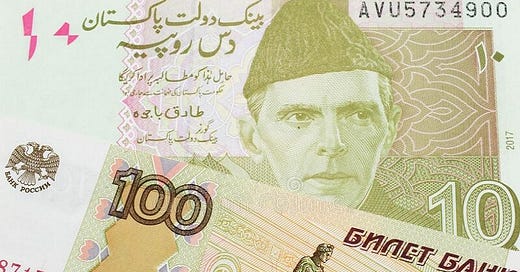Pakistan Is Far Behind Afghanistan & India When It Comes To Non-Dollar Trade With Russia
One can only imagine how far ahead Pakistan could have been instead had its former premier not been ousted, but the fact of the matter is that this country went from being a regional leader in pioneering relations with Russia to a regional anomaly in less than half a year.
President of the Trade House of Pakistan Association Zahid Ali Khan’s statement on Tuesday that his country is in the process of finalizing non-dollar trade with Russia via rubles and yuan that he expects to enter into effect by sometime next year was rightly met with applause by multipolar supporters. It showed that some in that South Asian state are indeed attempting to make good on President Putin’s proposal from mid-September’s SCO Summit to comprehensively expand trade ties, yet when compared to the progress that Afghanistan and India have already achieved, it’s actually disappointing.
Some in India have already been using the yuan to facilitate bilateral transactions since this summer, and Sputnik just reported on Friday citing unnamed government sources from that country that China offered them a 15% discount to further incentivize the use of its currency to that end. Afghanistan, meanwhile, just clinched a provisional food and fuel deal with Russia that involves either barter or national currencies considering how unrealistic it is expect that impoverished war-torn country to have any significant amount of spare dollars on hand.
What’s so impressive about these two developments, which also involve Pakistan’s other two neighbors since China has already been using national currencies in trade with Russia and Iran just started to do so too over the summer, is that India is one of the US’ top strategic partners anywhere in the world while the Taliban has thus far been struggling for international legitimacy. Delhi obviously doesn’t care how Washington will react since it’ll always prioritize its objective national interests while Kabul clearly decided to prioritize Moscow as its top strategic partner in its geo-economic balancing act.
Pakistan’s hitherto lack of progress on de-dollarizing its trade with Russia therefore makes it a regional anomaly. It also raises questions about what its Ambassador to Russia’s previously claimed in early June about his country’s businessmen already employing a currency swap with China. If that was actually the case, then the President of the Trade House of Pakistan – who RT described in their piece about this as also serving as executive director of the Russia-Pakistan Business Council at the Russian Chamber of Commerce and Industry – wouldn’t have claimed that this wouldn’t happen till next year.
This “politically incorrect” observation isn’t being shared to imply in any way that the Pakistani Ambassador to Russia shared fake news, but just that there’s undeniably a disconnect between his statement and that of the aforementioned trade official. In hindsight, it could very well have been the case that His Excellency was fed false information by the post-modern coup regime that overthrew former Prime Minister Imran Khan in early April as part of an American plot to punish him for his independent foreign policy, especially its Russian dimension.
In any case, the latest update – pending any potential clarification from the Pakistani Ambassador to Russia, which isn’t expected to be forthcoming but nevertheless can’t be ruled out – shows how far behind Pakistan is compared to Afghanistan and India when it comes to non-dollar trade with Russia. One can only imagine how far ahead it could have been instead had its former premier not been ousted, but the fact of the matter is that this country went from being a regional leader in pioneering relations with Russia to a regional anomaly in less than half a year.




